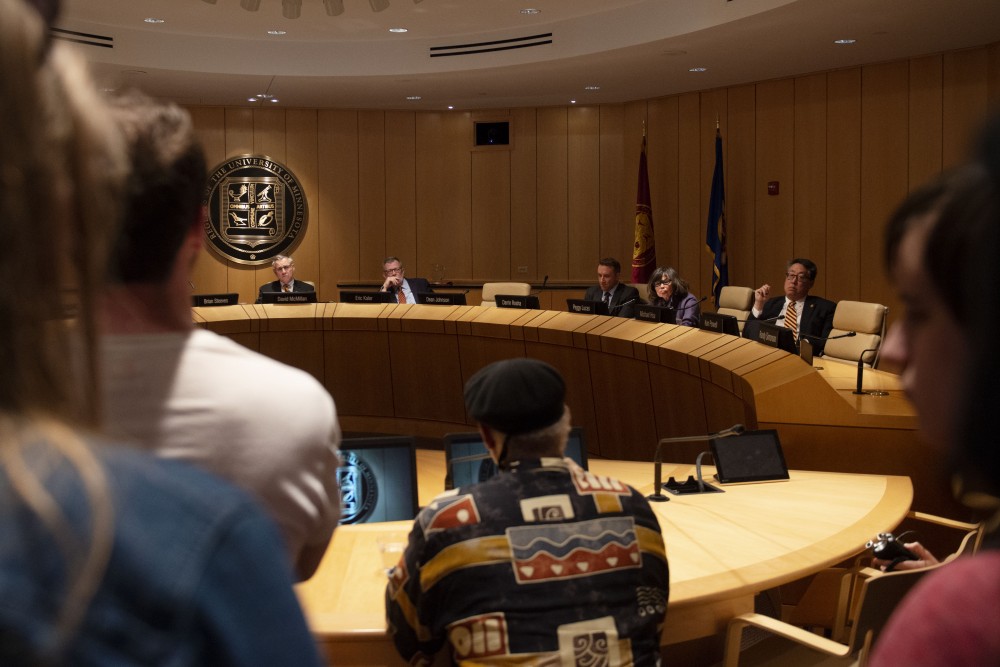Even before an overwhelming majority of regents voted against renaming buildings Friday, it was clear that disagreement about the University of Minnesota’s complex history was far from over.
Protesters overtook a special meeting last Friday to decry the Board of Regents’ discussion and push back against some regents’ sustained rebukes of a faculty task force. Audience members rallied around longtime African American studies professor John Wright, who stepped forward to speak about his family’s experience of discrimination under President Lotus Coffman in the 1930s.
Though many on the board said they were moved by Wright’s testimony, regents voted 10-1 not to rename Coffman Union, Nicholson Hall, Coffey Hall and Middlebrook Hall.
The board’s decision — and the events leading up to it — has drawn intense public outcry from students, faculty and other proponents who say the University has failed to reckon with its legacy of discrimination.
Although the board’s decision was expected, Wright said regents showed a lack of understanding about history and how we remember it.
“It’s frustrating. And it’s not just disappointing, it’s enraging on one level,” Wright told the Minnesota Daily. “Particularly from so-called mature, professionally trained adults who have high civic responsibility in the world of higher education, who apparently know so little about the context of these events on campus.”
But Wright acknowledged in his speech that the University’s “conspiracy of silence” is over, saying there is greater public awareness about this history: “Regardless what this board decides, we will continue to wrestle with these things in the future.”
The regents’ decision fell short, said Neal Joseph Loevinger, who learned from the “A Campus Divided” exhibit that his father and uncle were among the Jewish student activists that were surveilled by University administrators during the 1930s.
And for Loevinger, the historical record is clear.
“There are plenty of historical figures whose legacy we can judge by the totality of their work,” he said. “Unfortunately for Mr. Nicholson and Mr. Coffman, the legacy of their work — which certainly includes good things on behalf of the the students of the University of Minnesota — also included actions which we now regard as dishonorable.”
Loevinger said if regents are determined to keep the buildings named after Coffman and Nicholson, then “I would humbly suggest they name something after my father Robert Loevinger … but since my father was a humble and unassuming man, if we can’t a name big building after him, I’ll be satisfied with a bike rack or park bench.”
For Riv-Ellen Prell, the curator of “A Campus Divided” exhibit, the meeting represented a “moral victory,” especially for student advocates who brought greater attention to the University’s past.
“That moral victory belongs entirely to those people, not seated around the Board of Regents, but those faculty and students and some administrators,” Prell said.
But for many students, the regents’ decision is disappointing.
Chloe Williams, a student who started a petition to rename Coffman last year, said the decision made her “feel embarrassed to be a student at this University.”
“I honestly think [the board] should be ashamed of themselves,” she said. “They were on the wrong side of history with this decision.”
However, the decision to keep buildings’ names was welcome news for Chris Middlebrook, the grandson of former University Vice President William Middlebrook.
Though he doesn’t have a stance on the other three namesakes, Middlebrook said his grandfather was wrongly mischaracterized as a racist and an anti-Semite by “assumptions,” “leaps of faith” and scant evidence.
“I really don’t think my grandfather should have been a part of this discussion in the first place,” said Middlebrook, a 1983 graduate of the University Law School.
Middlebrook is relieved the name isn’t coming down from the West Bank residence hall, but he said accusations made against his grandfather were like the contents of Pandora’s box: They’re hard to rein in.
“His legacy is still being attacked and his reputation attacked as a racist and a segregationist, ” he said. “The real relief would come if it’s acknowledged that yes, it’s true, he really shouldn’t have been a part of this renaming process.”
But for many, criticism of regents goes beyond the vote on renaming. Many faculty expressed outrage at the accusations levied at the task force, including Regent Michael Hsu’s calls to investigate academic dishonesty.
Several faculty members also voiced their objections at the Friday meeting, including Elaine Tyler May, chair of the University’s history department.
At several points, May interjected over regents, shouting for the board to submit questions to the task force so faculty could respond.
“I think it’s outrageous that members of the Board of Regents would question the work of world-class scholars doing their job at the request of the president,” May said.
Regent Darrin Rosha, a vocal critic of the task force, said that discussing renaming was “premature” because the historical evidence is not clear.
Rosha said there are outstanding questions about the task force’s report. He’s still looking for clarification from task force members about several concerns, including out-of-place quotations included in the report. Rosha said he plans to forward a list of questions in writing.
Regent Abdul Omari, the only member of the board to voice support for renaming, said he is “hopeful” there will be an open and inclusive discussion going forward.
But Omari said there first needs to be a level of trust in faculty’s work. Omari criticized other regents at the Friday meeting for attacks on the task force, which he said drove away productive conversation.
“We have faculty for a reason and they’re good at what they do,” he said. “And if we don’t start on the premise that our faculty belong here and they know what they’re doing and they do good research, then we can’t move forward.”
Many members of the board appear ready to move on from the issue of renaming entirely.
“As a community, the University needs to move on and we need to move on in harmony,” said Regent Steve Sviggum at the Friday meeting.
In response to criticism about going forward with a vote, Vice Chair Regent Ken Powell said Friday, “We just felt it was time to attempt to bring some closure to the debate.”
For Prell, whose research on the “A Campus Divided” started the discussion of renaming, the push for the University to reckon with its racist and anti-Semitic history will continue.
Prell, the former director of the Center for Jewish Studies, pointed out the center is housed in the building named after Dean Edward Nicholson, whom the task force faulted for spying on Jewish students.
When she first started this historical research, Prell said she was interested in installing a plaque “to simply tell what he did and who he was.” That may still happen.
Despite shooting down renaming, the board also passed a resolution directing incoming President Joan Gabel to develop “ongoing commemorations, educational activities, and/or permanent educational displays.” As it stands now, Nicholson Hall will keep its name.
Prell always knew that telling the University’s dark history wasn’t going to be easy.
“You don’t create public history without expecting a fight,” she said. “But what you want to do is keep moving forward to tell these histories for the very specific purpose to think about the future.”








